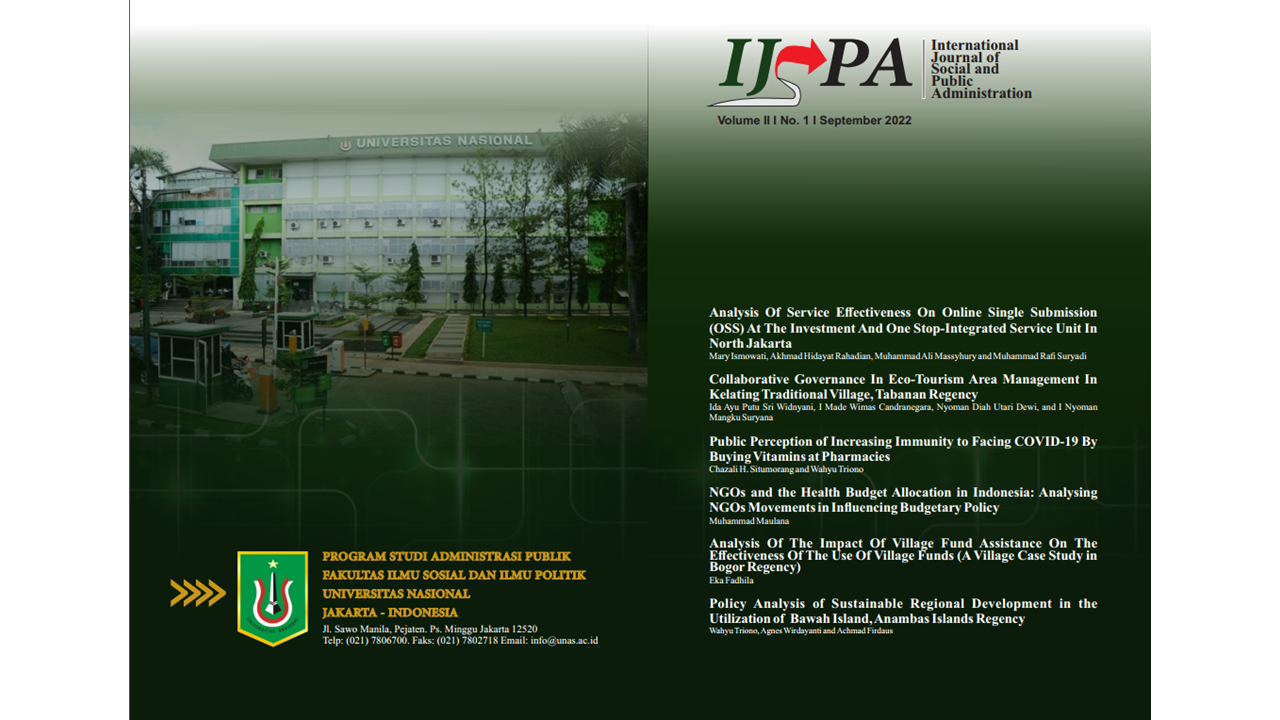Analysis Of Service Effectiveness On Online Single Submission (OSS) At The Investment And One Stop-Integrated Service Unit In North Jakarta
Abstract
This study analyze the effectiveness of online single submission (oss) services in an effort to improve service quality at the unit investment and one-stop integrated services in North Jakarta. This is the implementation of Regional Policy No. 12 in 2013, and implementation of Presidential Regulation No. 91 in 2017 about the acceleration of ease of doing business through the information technology-based licensing system (OSS). The research method used a qualitative approach by conducting interviews with informants to determine the phenomenon of the effectiveness of online single submission (oss) services. Another focus is 5 aspects of service quality from Parasuraman (1985). This study involved two research members from students in their thesis research. Interviews were conducted with a number of informants. The results of the research, the Effectiveness of Integrated Business Licensing Services Electronically through Online System Submission (OSS) has been implemented well.However, this OSS system still has many problems, both systemally and when the community wants to know information about permit applications through OSS. Five (5) aspects of service quality well done. The main obstacle is that the community sometimes finds it difficult to enter the OSS system. people who do not understand the OSS system to apply for business licensing. Not all people know information on how to apply for permits through OSS. There are still officers who do not fully understand the OSS system. Solutions to overcome various obstacles have been carried out but not optimal.References
Akib, Haidar, 2010, Policy Implementation: What, Why, and How, Journal of Public
Administration, Volume 1 No.1 of 2010, pp. 1 - 11.
Creswell, John W. 2016. Research Design: Qualitative, Quantitative, and Mixed Approaches. Yogyakarta: Student Library.
Deursen Van, (2009) “Improving digital skills for the use of online public information
and services”, Government Information Quarterly, Vol 26 (2) P: 333-340.
Gerson, Richard F., 2002, Measuring Customer Satisfaction, Translation, PPM, Jakarta.
Haag dan Keen. (1996). Information Technology: Tomorrow’s Advantage Today. Hammond: Mcgraw-Hill College.
Hendrik Scholta a, et all, (2012) “From one-stop shop to no-stop shop: An e-government
stage model” Government Information Quartely, Vol 36 ( 1) P : 11-26.
Hogwood, Brian W., and Lewis A. Gunn, 1983, Policy Analysis For The Real World, Oxford: Oxford University Press.
Kernaghan, Kenneth, (2009) “Moving towards integrated public governance: improving service delivery through community engagement, International Review of Administrative Sciences, June 2009.
Oates, W.E., 1995. "Comment on Conflict and Dilemmas of Decentralization by Rudolf
Holmes". The world Bank Research Observer. Pp 351-353.
Pollit, Chirstopher, Johnston Birchall, and Keith Putman, 1998, Decentralizing Public Sevice Management, London: MacMillan.
Steers, Richard M.; Ungson, Gerardo R.; Mowday, Richard T.; [1985], Managing effective organizations ; Kent Pub. Co.
Supranto, J. (2001), Measuring the Level of Customer Satisfaction to Increase Market Share, RinekeCipta, Jakarta.
Yusriadi,Haedar Akib and Andi Ihsan, (2017), “Bureaucratic Reform in Public Service: A Case Study on the One Stop-Integrated Service”, Mediterranean Journal of Social Sciences, Vol 8 (2).
Williams dan Sawyer. (2003). Using Information Technology: A Practical Introduction to Computers and Communications. London: Career Education.
Wimmer, A (2002), “A European perspective towards online one-stop government: the
eGOV project”, Electronic Commerce Research and Applications, Vol 2 (1) P:92-103.
Wimmer,A (2002),” Integrated Service Modelling for Online One-stop Government”,
Electronic market, Vol 12 (3), Pages: 149-156.
Zeithaml, Valeria A., A.Parasuraman, and L.L.Berry. (1985). A Conceptual model of
service quality and its implications for future research”, Journal of marketing,
P.44
Published
How to Cite
Issue
Section
License
Authors who publish with this journal agree to the following terms:
- Authors retain copyright and grant the journal right of first publication with the work simultaneously licensed under a Creative Commons Attribution License that allows others to share the work with an acknowledgment of the work's authorship and initial publication in this journal.
- Authors are able to enter into separate, additional contractual arrangements for the non-exclusive distribution of the journal's published version of the work (e.g., post it to an institutional repository or publish it in a book), with an acknowledgment of its initial publication in this journal.
- Authors are permitted and encouraged to post their work online (e.g., in institutional repositories or on their website) prior to and during the submission process, as it can lead to productive exchanges, as well as earlier and greater citation of published work (See The Effect of Open Access).

